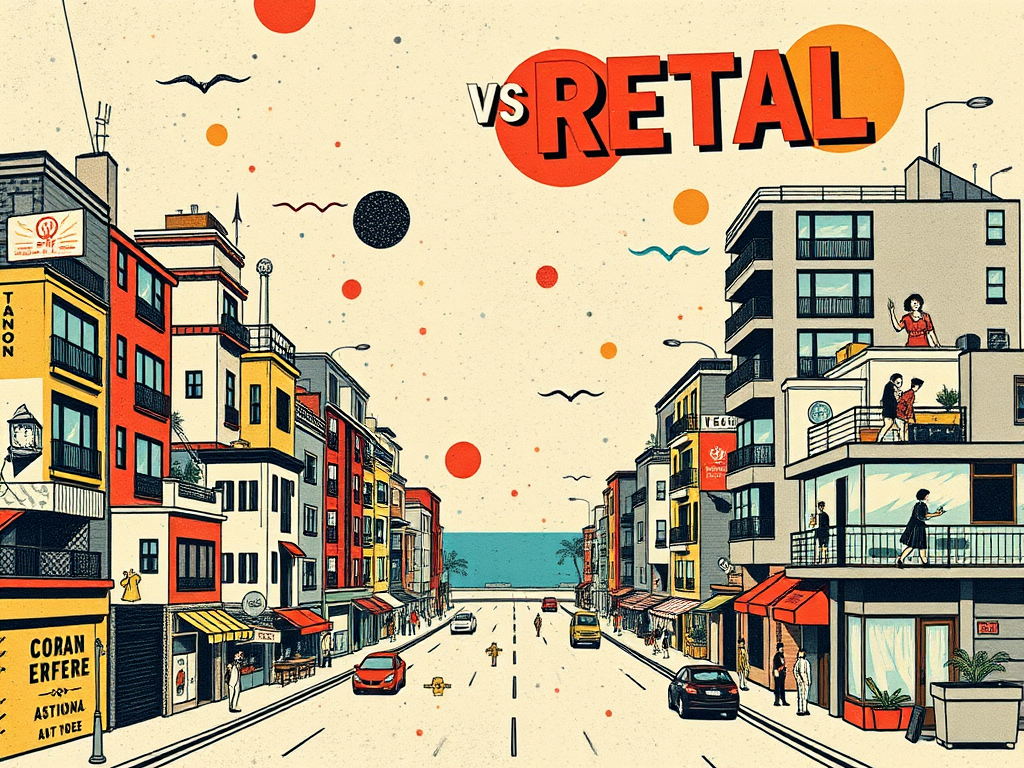
Urban Airbnbs vs. Island Villas: Comparing Profitability in Greece’s Rental Market
Reading time: 12 minutes
Table of Contents
- Introduction
- The Greek Rental Market Landscape
- Urban Airbnbs: The Allure of City Living
- Island Villas: Luxurious Escapes
- Profitability Analysis
- Economic Factors Influencing Rental Markets
- Investment Considerations
- Future Outlook
- Conclusion
- FAQs
Introduction
As the Greek economy continues to recover and tourism rebounds, investors are increasingly turning their attention to the country’s vibrant rental market. Two distinct segments have emerged as particularly attractive: urban Airbnbs in bustling city centers and luxurious island villas offering serene getaways. This comprehensive analysis delves into the profitability of these two investment options, examining the nuances of each market and the economic factors that influence their performance.
The Greek Rental Market Landscape
Greece’s rental market has undergone significant transformation in recent years, driven by a combination of economic recovery, tourism growth, and changing traveler preferences. The country’s unique geography, with its blend of historic urban centers and idyllic islands, presents diverse opportunities for property investors.
Key Market Indicators
Before diving into the specifics of urban Airbnbs and island villas, it’s crucial to understand the broader economic context shaping Greece’s rental market:
- Tourism Growth: Despite global economic uncertainties, Greece has seen consistent growth in tourist arrivals, with a record 33 million visitors in 2019 and a strong rebound post-pandemic.
- Economic Recovery: Greece’s GDP growth has stabilized, with projections indicating continued expansion in the coming years.
- Property Prices: After years of decline, property values in key tourist areas and major cities have begun to appreciate, albeit at different rates.
- Regulatory Environment: Recent legislation has aimed to balance the growth of short-term rentals with the needs of long-term residents, particularly in urban areas.
Urban Airbnbs: The Allure of City Living
Urban Airbnbs, particularly in cities like Athens and Thessaloniki, have become increasingly popular among both tourists and investors. These properties offer visitors an authentic local experience while providing property owners with potentially lucrative returns.
Advantages of Urban Airbnbs
- Year-round Demand: Unlike seasonal destinations, major cities often attract visitors throughout the year, including business travelers and cultural tourists.
- Lower Initial Investment: Apartments in urban areas typically require less capital outlay compared to standalone villas.
- Ease of Management: The concentration of properties in urban areas can simplify management and maintenance tasks.
- Diverse Guest Profile: Urban Airbnbs attract a wide range of guests, from solo travelers to families, potentially leading to higher occupancy rates.
Challenges and Considerations
- Increased Competition: Popular urban areas often have a high density of short-term rental properties, leading to potentially fierce competition.
- Regulatory Scrutiny: Many cities are implementing stricter regulations on short-term rentals, which could impact profitability.
- Higher Operational Costs: Urban properties may face higher utility costs and local taxes compared to rural or island locations.
Island Villas: Luxurious Escapes
Greek islands have long been synonymous with luxury vacations, and high-end villas on islands like Mykonos, Santorini, and in regions like the property for sale in peloponnese continue to captivate affluent travelers. These properties offer a different value proposition compared to urban rentals.
Advantages of Island Villas
- Premium Pricing: Luxury villas command significantly higher nightly rates, especially during peak seasons.
- Exclusivity Factor: The limited supply of high-end properties on popular islands can lead to sustained demand and pricing power.
- Potential for Capital Appreciation: Prime island properties have shown strong appreciation in recent years, offering potential gains beyond rental income.
- Extended Stay Potential: Villas are often booked for longer periods, reducing turnover costs and potentially increasing overall profitability.
Challenges and Considerations
- Seasonality: Many Greek islands experience significant seasonal fluctuations in demand, potentially leading to periods of low occupancy.
- Higher Initial Investment: Luxury villas typically require substantial upfront capital, limiting the pool of potential investors.
- Maintenance Costs: The upkeep of larger, more luxurious properties can be considerable, especially in remote island locations.
- Weather Dependency: Island properties may be more susceptible to weather-related disruptions, potentially impacting bookings and maintenance costs.
Profitability Analysis
To truly understand the profitability of urban Airbnbs versus island villas, we need to examine key financial metrics and performance indicators.
Revenue Potential
Urban Airbnbs in Athens or Thessaloniki might achieve average daily rates (ADR) ranging from €50 to €150, depending on location and property quality. Occupancy rates in well-managed urban properties can reach 70-80% annually.
In contrast, luxury island villas on popular destinations like Mykonos can command ADRs of €500 to €2,000 or more during peak season. However, occupancy rates may average 40-60% annually due to seasonality.
Cost Structures
Urban Airbnbs typically have lower acquisition costs but may face higher ongoing expenses:
- Property Management: 15-25% of revenue
- Cleaning and Maintenance: 10-15% of revenue
- Utilities and Internet: 5-10% of revenue
- Local Taxes and Fees: Vary by municipality, but can be significant
Island villas, while requiring larger initial investments, may benefit from economies of scale:
- Property Management: 10-20% of revenue (potentially lower for larger properties)
- Maintenance and Landscaping: 5-10% of revenue
- Utilities: Can be substantial, especially for properties with pools or extensive grounds
- Marketing: Often higher for luxury properties, ranging from 5-15% of revenue
Net Operating Income (NOI) Comparison
When analyzing NOI, urban Airbnbs may achieve yields of 5-8% annually, with the potential for higher returns in prime locations or with exceptional management. Island villas, while potentially generating higher gross revenues, often see yields in the 3-6% range due to higher costs and seasonality. However, the potential for capital appreciation can significantly enhance overall returns for island properties.
Economic Factors Influencing Rental Markets
Several macroeconomic and local economic factors play crucial roles in shaping the profitability of both urban Airbnbs and island villas:
Currency Fluctuations
The strength of the euro relative to other currencies can significantly impact tourism demand. A weaker euro can make Greece more attractive to international visitors, potentially boosting demand for both urban and island rentals.
Global Economic Conditions
Economic downturns in key source markets (e.g., Germany, UK, USA) can disproportionately affect luxury villa rentals, while urban Airbnbs might prove more resilient due to their broader appeal and lower price points.
Local Infrastructure Development
Investments in transportation infrastructure, such as airport expansions or new ferry routes, can dramatically impact the accessibility and attractiveness of different locations. Urban centers with improved connections may see increased demand, while enhanced access to islands could extend their traditional seasons.
Regulatory Environment
Changes in short-term rental regulations, tax policies, or zoning laws can have profound effects on profitability. Urban areas are more likely to see stringent regulations, potentially limiting supply and driving up prices for compliant properties.
Investment Considerations
When deciding between urban Airbnbs and island villas, investors should consider several key factors:
Risk Tolerance
Urban Airbnbs generally offer more stable, year-round income but with potentially lower returns. Island villas present higher risk-reward profiles, with the potential for substantial seasonal profits but also longer periods of low occupancy.
Management Approach
Urban properties may be easier to self-manage for investors living in or near the city. Island villas almost always require professional management, which can impact profitability but also reduce the owner’s time investment.
Exit Strategy
The liquidity of urban apartments is typically higher, allowing for easier exit if needed. Luxury island properties may take longer to sell but could offer significant capital appreciation over time.
Diversification Potential
Investors with larger portfolios might consider a mix of urban and island properties to balance risk and capture different market segments.
Future Outlook
As we look to the future of Greece’s rental market, several trends are likely to shape the landscape for both urban Airbnbs and island villas:
Sustainable Tourism
Growing environmental awareness may lead to increased demand for eco-friendly properties, potentially benefiting well-designed urban rentals and sustainably built island villas.
Digital Nomad Influx
Greece’s efforts to attract digital nomads could boost demand for long-term urban rentals, potentially shifting some inventory away from the short-term market.
Luxury Experience Evolution
High-end travelers are increasingly seeking unique, authentic experiences. This trend could benefit both carefully curated urban Airbnbs and island villas that offer immersive local experiences.
Technological Integration
The adoption of smart home technologies and AI-driven property management systems could significantly reduce operational costs and improve guest experiences across both urban and island properties.
Conclusion
The choice between investing in urban Airbnbs or island villas in Greece ultimately depends on an investor’s goals, risk tolerance, and market outlook. Urban properties offer more consistent demand and potentially easier management, while island villas present opportunities for premium pricing and significant capital appreciation.
Both segments of the market show promise, driven by Greece’s enduring appeal as a tourist destination and its ongoing economic recovery. However, success in either market requires careful consideration of location, property quality, management approach, and broader economic factors.
As the Greek rental market continues to evolve, investors who can adapt to changing traveler preferences, leverage technology, and navigate regulatory landscapes will be best positioned to maximize returns, whether in bustling city centers or on tranquil island retreats.
FAQs
1. Which investment typically requires less initial capital: urban Airbnbs or island villas?
Urban Airbnbs generally require less initial capital compared to island villas. City apartments, especially in areas popular with tourists, can offer a lower barrier to entry for investors. Island villas, particularly luxury properties, often demand significantly higher upfront investments due to their size, location, and amenities.
2. How does seasonality affect the profitability of urban Airbnbs versus island villas?
Seasonality tends to have a more pronounced effect on island villas. These properties often experience high demand and premium rates during summer months but may struggle with occupancy in off-seasons. Urban Airbnbs typically benefit from more consistent year-round demand, including business travelers and cultural tourists, leading to potentially steadier income streams.
3. Are there significant differences in property management costs between urban and island rentals?
Yes, there can be notable differences. Urban Airbnbs often have lower management costs due to easier access and the availability of local services. Island villas, especially luxury properties, may incur higher management expenses due to their remote locations, larger size, and the need for specialized maintenance (e.g., pool upkeep, landscaping). However, the higher rental rates for island villas can often offset these increased costs.
4. How might future regulatory changes impact investments in Greek rental properties?
Regulatory changes could significantly impact both urban and island rentals. Urban areas are more likely to see stricter regulations on short-term rentals, potentially limiting the supply of Airbnb-style accommodations. This could benefit compliant properties by reducing competition. Island villas may face increased environmental regulations or limits on new construction, which could increase the value of existing properties but make new developments more challenging.
5. What role does property appreciation play in the overall investment return for urban Airbnbs versus island villas?
Property appreciation can be a significant factor in overall returns, especially for island villas. Prime island locations have shown strong appreciation in recent years, often outpacing urban areas. This potential for capital gains can complement rental income, making island villas attractive despite potentially lower rental yields. Urban properties may offer more modest appreciation but can compensate with higher and more consistent rental yields. Investors should consider both rental income and potential appreciation when evaluating total return prospects.

Article reviewed by Jean Dupont, Institutional Investment Advisor | ESG & Impact Investing Pioneer | Aligning Profit with Purpose for Pension Funds, on March 22, 2025





